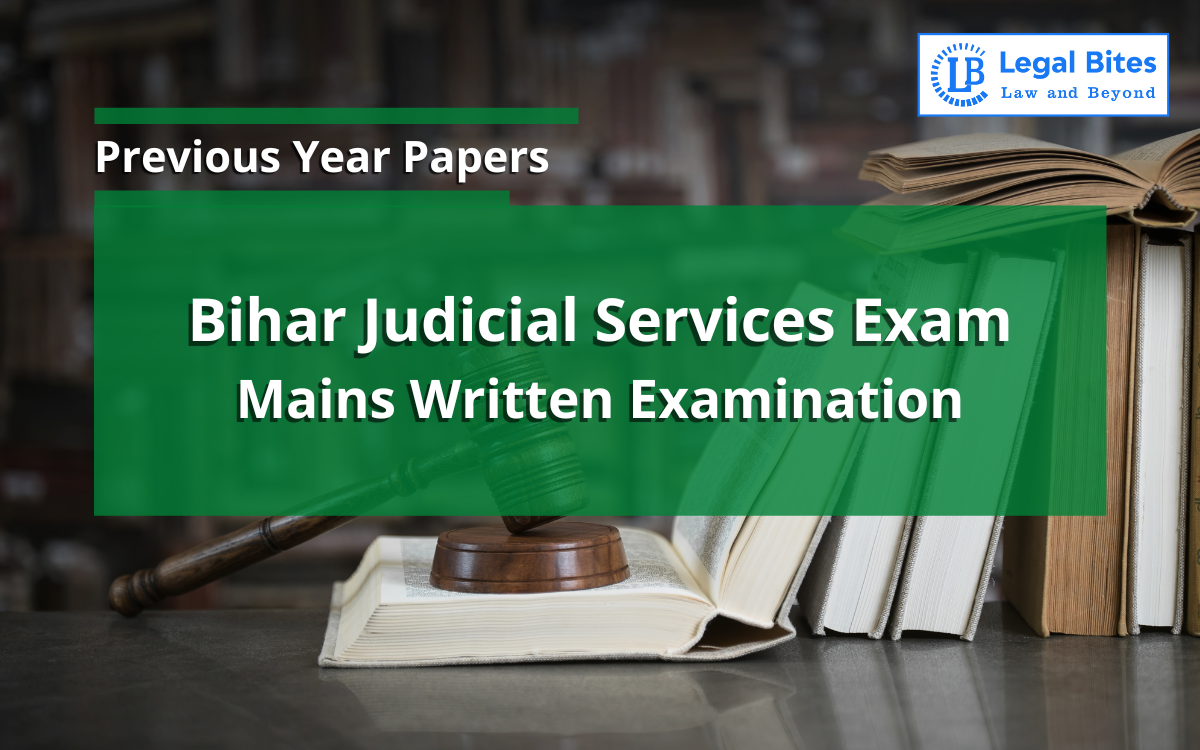Bihar Judicial Services Exam Mains 2018 Previous Year Paper (Law of Transfer of Property And Principles of Equity: Including the Law of Trusts And Specific Relief)
Candidates preparing for Bihar Judicial Services Exam should solve the Bihar Judicial Services Exam Mains 2018 (Law of Transfer of Property And Principles of Equity: Including the Law of Trusts And Specific Relief).

Candidates preparing for Bihar Judicial Services Exam should solve the Bihar Judicial Services Exam Mains 2018 (Law of Transfer of Property And Principles of Equity: Including the Law of Trusts And Specific Relief) and other previous year question papers before they face Prelims and Mains.
It also gives an idea about the syllabus and how to prepare the subjects by keeping the previous year's questions in mind. All toppers are mindful and cognizant of the types of questions asked by the BJS, to be aware of the various tricks and types of questions. This should be done by every aspirant when starting their preparation. It is very important to have an overall understanding of the pattern and design of questions.
Bihar Judicial Services Exam Mains 2018 Previous Year Paper (Law of Transfer of Property And Principles of Equity: Including the Law of Trusts And Specific Relief)
Only practising the authentic question papers will give you a real feel of the pattern and style of the questions. Here's Bihar Judicial Services Exam Mains 2018 Previous Year Paper (Law of Transfer of Property And Principles of Equity: Including the Law of Trusts And Specific Relief).
Bihar Judicial Services Mains Written Examination 2018
Law of Transfer of Property And Principles of Equity: Including the Law of Trusts And Specific Relief
Law of Transfer of Property And Principles of Equity: Including the Law of Trusts And Specific Relief
Paper: Law of Transfer of Property And Principles of Equity: Including the Law of Trusts And Specific Relief
Time: 3 Hours
Maximum Marks: 150
Note: Marks are indicated against each question
Answer six questions, selecting three from each group.
Part I
Question 1
(a) The formation of doctrine of election is that one cannot approbate and reprobate at the same time. Discuss with examples. (15 Marks)
(b) A is a Chief Executive Officer in a Multi-National Company situated at Chennai. There is a house in the name of his wife in Chennai. The company gives a house to A in the capacity of Chief Executive Officer and by the same deed gives the house of A's wife to B. The company has confidence that A's wife will reside with A in company's house. Is wife of A bound for election? (10 Marks)
Question 2
(a) Can the right of equity of redemption be validly curtailed under the Transfer of Property Act? Explain. (10 Marks)
(b) Discuss the duration of certain leases in the absence of written contract or local usage. (5 Marks)
(c) Does the doctrine of lis pendens apply to an ex parte suit? (5 Marks)
(d) ls there any hindrance in minor becoming a transferee? (5 Marks)
Question 3
(a) Define sale of immovable property. What is distinction between sale and contract for sale? Does the purchaser acquire any right in or charge upon the property to be sold by the virtue of the contract for sale of such property? Discuss. (5+10+10=25 Marks)
Question 4
(a) Define a lease. How does a lease differ from a licence and a mortgage? (15 Marks)
(b) A approaches B, an advocate to defend his case. B suggests that A should transfer his property in the name of the brother of B to save it from being taken away in the legal process. A does so. Is it a valid gift? State reasons. (5 Marks)
(c) A mails a bank draft of Rs. 50,000 to B, his son as gift. B in return writes a letter to A accepting the gift. Before B posts it, he dies. Whether the gift is valid? Would it make any difference if A dies instead? (5 Marks)
Question 5
(a) Define a simple mortgage. How is it to be executed? What are the remedies available to a simple mortgagee for the recovery of mortgage money? (5+5+5 = 15 Marks)
(b) Though the Transfer of Property Act deals with transfer inter vivos, yet an interest may be created in favour of an unborn person. Discuss. (10 Marks)
Part - II
Question 6
(a) Define equity. Explain fully the view that "equity came not to destroy the law, but to fulfill it". (15 Marks)
(b) What were the causes for passing the Judicature Act of 1873? What changes were made by this Act? (10 Marks)
Question 7
Explain any two of the following of law originating therefrom: maxims, discussing the principles: (25 Marks)
(a) He who seeks equity, must come with clean hand.
(b) Equity will not suffer a wrong to be without a remedy.
(c) Equality is equity.
Question 8
(a) Define trust and distinguish it from bailment and contract. (15 Marks)
(b) When can a new trustee be appointed? Who can appoint him and what are its effects? Discuss. (10 Marks)
Question 9
(a) What are the principal disabilities of a trustee? How much is he subject to the principle of delegatus non potest delegate? Discuss. (15 Marks)
(b) What are the rights of beneficiary? What remedies are available to him in the event of breach of trust? (10 Marks)
Question 10
(a) Explain 'specific relief'. What are the circumstances in which a contract is not specifically enforceable? (25 Marks)


